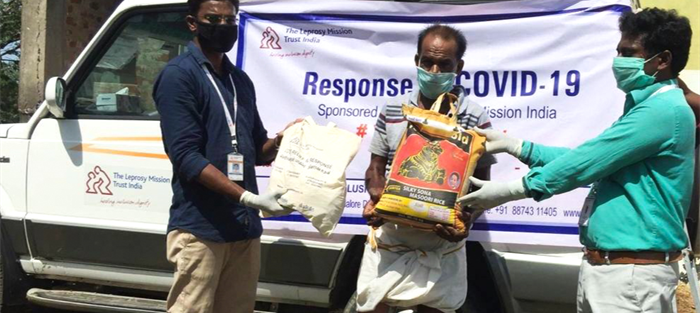How has the global pandemic made life harder for people affected by leprosy?

Our partners at the Global Partnership for Zero Leprosy (GPZL) set out, at the start of the global pandemic, to find out what challenges the pandemic was presenting to people affected by leprosy. They knew that this process would allow them to work with others to intervene where intervention was most needed.
Over a period of weeks they had conference calls with people affected by leprosy and leprosy-focused NGOs across the world to find out what this pandemic has meant for people affected by leprosy. Here’s a summary of what they found.
People affected by leprosy have been cut off from the care they need
Leprosy is a medical condition and it requires medical treatment. People affected by leprosy can have a large number of different medical issues, including eye problems, ulcers, damaged nerves, and leprosy reaction (acute inflammation).
These are just a sample of the medical problems that leprosy can cause and all of them will need medical support at some time. Unfortunately, the GPZL team discovered that people affected by leprosy who need medical treatment have struggled to access it as public transportation closures have made accessing health facilities almost impossible.
People affected by leprosy have been cut off from essential goods
The Covid-19 pandemic has caused shortages of food and other essential items in even the world’s richest communities. For people affected by leprosy, many of whom live in the poorest communities in the world, access to basic goods has become difficult.
The GPZL team found that access to clean water, to food and to soap has been difficult to find. Travel restrictions have meant that many people affected by leprosy cannot earn a living and cannot reach the places where they can purchase food.
As well as this, many communities which are affected by leprosy did not have access to clean water even before the pandemic. That vulnerability has been made even more serious at a time when washing hands has become a key weapon in the fight against Covid-19.
People affected by leprosy have been cut off from government support
Most governments across the world have provided support to vulnerable citizens during the pandemic by providing them with what they need to get by. Many people affected by leprosy have also benefitted from these resources, but there are still many more who are cut off from this support.
The GPZL team heard that people affected by leprosy haven’t accessed this support because they cannot travel to access the support, either because they live in remote areas, because they have a disability that makes travel hard, or because they are shielding from the virus. Many people affected by leprosy have also missed out on support because they have been left out of government census and welfare data. The information and support required doesn’t make it to people affected by leprosy because the system does not know they are there.
People affected by leprosy have been cut off from their livelihoods
Across many parts of the developing world, day labourers and those running very small commercial enterprises have lost out on their livelihoods during the pandemic. As they are no longer able to sell their goods or attend their work places, they have lost out on much of, if not all, of their income. For too many people affected by leprosy, there are no savings for them to fall back on. They risk going homeless and hungry.
--
The report by GPZL is a really valuable resource for anyone who wants to know how people affected by leprosy are suffering during this pandemic and how we can offer support. With the voices of so many people affected by leprosy being heard through the authors and contributors to the report, GPZL have done an excellent job of raising this issue.
If you would like to read the full report, you can do so here.